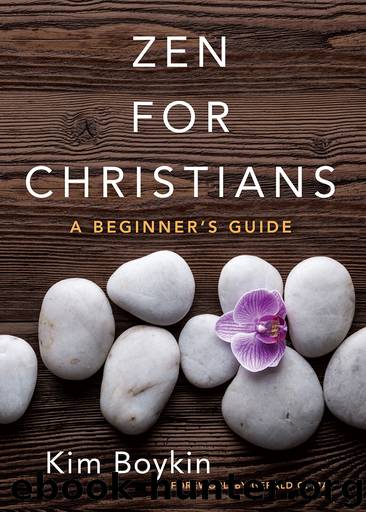Zen for Christians by Kim Boykin

Author:Kim Boykin
Language: eng
Format: epub
Publisher: Dover Publications
Published: 2018-04-21T16:00:00+00:00
Real Differences
There are, of course, many real and significant differences between Zen teachings and Christian teachings.
Although it isn’t fair to compare the good news of one tradition with the bad news of the other, it is fair to compare Zen’s good news with Christianity’s good news or Zen’s bad news with Christianity’s bad news. Even if both traditions say, “Things are a big mess, but it’s okay anyway,” they have different teachings about what the big mess is and why it’s okay anyway.
In Zen, the big mess is suffering, which is rooted in the illusion of “self.” In Christianity, the big mess is sin: our alienation from God and the resulting violations of the divinely established order. So in Zen the root problem is faulty perception, while in Christianity the root problem is faulty relationship.
In Zen, “it’s okay anyway” because we can awaken to our inherent freedom and selflessness. In Christianity, “it’s okay anyway” because salvation is offered through faith in Jesus Christ. There is no God or messiah involved in Zen realization as there is in Christian salvation. Again, the relationship with the divine is central in Christianity.
There is also a significant difference between the role of the Buddha in Zen and the role of Christ in Christianity. In the Zen tradition, the Buddha is not understood to be any sort of god, messiah, savior, or supernatural being, but simply a human being, a great teacher and example, someone who found a way of liberation from suffering and taught this way to others. While the Buddha and Christ are alike in some significant ways—and you can find many books comparing them and their teachings—in at least this one crucial way they are not alike. They play different roles in the liberation of their followers. The Buddha shows the way, while in most forms of Christianity, Jesus Christ is the way. Of course, Jesus’s life is also an example for Christians to follow, but it is faith in Christ that is salvific. There is no analogous “faith in the Buddha” in Zen. In Christianity, we are saved through Christ, whereas in Zen we are awakened not through the Buddha but rather by following the Buddha’s teachings and example. Jesus is necessary for salvation, but the Buddha is not necessary for enlightenment. Zen practitioners are grateful to the Buddha for his teachings, but someone else could have discovered and taught the same things he did. If archaeologists were to find evidence tomorrow that the Buddha never lived, it would have little to no effect on Zen practitioners or Zen practice.
The Buddha’s role is more like that of a Christian saint than that of Christ. The Buddha, like a saint, is an example to follow. We can be realized buddhas, and we can be saints. We can also be like Jesus in some respects, but in one fundamental and all-important respect we can never be like Jesus: we cannot be God. Jesus Christ is both fully human and fully divine, and the rest of us are only fully human.
Download
This site does not store any files on its server. We only index and link to content provided by other sites. Please contact the content providers to delete copyright contents if any and email us, we'll remove relevant links or contents immediately.
The 5 Love Languages: The Secret to Love That Lasts by Gary Chapman(8615)
The Space Between by Michelle L. Teichman(6141)
Assassin’s Fate by Robin Hobb(5296)
Wiseguy by Nicholas Pileggi(4662)
Everything Happens for a Reason by Kate Bowler(4097)
Gerald's Game by Stephen King(3965)
A Simplified Life by Emily Ley(3616)
Pillow Thoughts by Courtney Peppernell(3495)
The Power of Positive Thinking by Norman Vincent Peale(3494)
Resisting Happiness by Matthew Kelly(2916)
Girl, Wash Your Face by Rachel Hollis(2855)
Being Aware of Being Aware by Rupert Spira(2741)
Name Book, The: Over 10,000 Names--Their Meanings, Origins, and Spiritual Significance by Astoria Dorothy(2521)
Real Sex by Lauren F. Winner(2518)
More Language of Letting Go: 366 New Daily Meditations by Melody Beattie(2480)
The Holy Spirit by Billy Graham(2466)
Fast Facts on Defending Your Faith by John Ankerberg & John Weldon(2418)
Victory over the Darkness by Neil T. Anderson(2416)
The Secret Power of Speaking God's Word by Joyce Meyer(2285)
